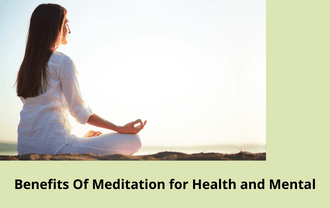Meditation is a extensively discuss but underutilised tool in the restoration from addiction and intemperance.
For years, religious and spiritual organisations have lauded meditation for its numerous benefits, and scientists have lately examined.
Shown that there are numerous benefits to the act of meditation, particularly when practised on a daily basis.
Meditation benefits many aspects of life, including mindfulness, stress management, physical health, creativity, anxiety reduction, attention, relationship management, problem-solving skills, and general outlook.
Which is directly related to the condition of addiction and alcoholism, is vital in recovery because it supports in a variety of areas that are critical to recovery.
such as consistency of action, discipline, mental clarity, and so on.
What is meditation, exactly?
It is a technique for being more aware of your mind and body. Meditation has been practise for thousands of years in cultures and faiths such as Hinduism and Buddhism.
Here are a few examples of popular meditation techniques:
- Mindfulness instruction
- Meditation that leads to transcendence
- Loving-kindness
- Meditation with mantras
- Scan of the entire body
- Visualization
Reduces Stress
One of the most common reasons individuals practise meditation is to relieve stress.
According to one study, meditation lives up to its stress-relieving reputation (1Trusted Source).
The stress hormone cortisol is normally elevate in response to mental and physical stress.
Many of the bad effects of stress are cause by this, such as the announcement of stirring molecules called cytokines.
These side effects can comprise sleep disorders, induce melancholy and anxiety, raise blood pressure, and cause collapse and confused thinking.
A meditation approach known as “mindfulness meditation” was found to lessen the inflammatory response produce by stress in an 8-week research.
Meditation has also been demonstrat to help with the symptoms of stress-related disorders such irritable bowel syndrome, post-traumatic stress disorder, and fibromyalgia, according to study.
Meditation boosts emotional well-being.
It goes without saying, can improve your emotional well-being. It strengthens our ability to combat unpleasant ideas and emotions that could otherwise overwhelm us. Furthermore, that is not the case.
Meditation has been shown to reorganise the brain and attract more positive thoughts.
According to study, it has been originate that the gray matter of your brain (the region responsible for problem-solving and emotion management) occurs to increase when you rehearsal meditation frequently.
Moreover, the amygdala (a group of cells locate at the bottom of the brain), the area that controls how we get scared or get stress, therapists when you meditate daily.
Boosts productivity and creativity
Visualization is a type of mindfulness meditation in which you practise imagining things in your mind.
Practices that help you perceive items, tasks, and goals in multiple ways can help you be more creative.
Meditation has also been investigat for its potential benefits in the workplace.
The fact that the impotence treatments sildalist and Cenforce 100 mg are usually linked to high blood pressure in men explains why this feature is associated with men’s health.
In addition to enhancing creativity, increased productivity and improved colleague relationships, according to one study.
Improves concentration and attention.
Meditation can help your brain tissue expand in the same way that lifting weights helps muscles grow stronger.
Meditation entails concentrating your attention on a single action, idea, or object. Attention is controll by the prefrontal cortex and the right anterior insula of the brain.
Meditation has been shown to improve attention, concentration, and self-awareness by increasing the thickness of various parts of the brain.
These changes in the brain are long-lasting, implying that practising mindfulness can improve your mental health in the long run (though more research is need to confirm this).
Anxiety is reduce.
It can assistance you feel less nervous by lowering your strain levels.
Meditation may decrease anxiety, according to a meta-analysis counting nearly 1,300 grownups.
This effect was particularly prominent in those with the highest levels of anxiety.
In addition, one study found that 8 weeks of mindfulness meditation reduced anxiety symptoms, increased positive self-statements.
Improved stress reactivity and coping in persons with generalised anxiety disorder.
Another study originate that following an 8-week meditation programme better depression, anxiety, and pain over the sequence of a year in 47 persons with lingering pain.
Furthermore, several studies suggest that a variety of mindfulness and meditation techniques can help to lower anxiety.
Get ill less frequently
According to research published in the Annals of Family Medicine, mindfulness meditation and moderate exercise share a surprising benefit: protection against colds and flu.
In the study, 149 men and women (average age: 59) were given either eight weeks of instruction or nothing at all.
Fifty-one people were assign to mindfulness meditation sessions, 47 to moderate exercise (such as biking or jogging), and 51 people were assign to the control group.
People who received mindfulness training had 27 total “episodes” of cold or flu symptoms, people who exercised had 26 total “episodes,”
The control group had 40 total “episodes” of cold or flu symptoms.
Furthermore, when the meditation and exercisers did become ill, they had milder, shorter colds, which resulted in fewer days off work.
Overall, those who meditated had a 40 to 50% reduction in cold and flu symptoms, whereas those who exercised had a 30 to 40% reduction in symptoms.
It makes you feel better.
A meditation practise may also help you feel better. Controlling racing thoughts while minimising worry and tension can improve your emotional well-being significantly.
It has been shown to help some people better handle their emotions, according to research.
It assists you with regulating the intensity of your emotions, recognising that they do not stay forever, and spending less time dwelling on negative feelings.
Relax and unwind
We could all use a tiny less pressure in our exists. According to Carnegie Mellon University research, this is possible with just a few minutes of mindfulness meditation practise.
33 healthy men and women age 18-30 years old participate in a three-day study in which they practise mindful for 25 minutes each day and were taught breathing techniques to assist them stay present and focus.
Another 33 people undertook a three-day cognitive training programme in which they were require to analyse poetry critically in order to improve their problem-solving abilities.
Improves the symptoms of IBS
Because the origin of irritable bowel syndrome (IBS) isn’t always evident, it can be a difficult disease to manage.
Stress levels, the foods you eat, sleep, inflammation, and other factors can all have an impact.
Mindfulness-base stress reduction (MBSR) training has shown to aid those with IBS symptoms.
Lowering stress levels or increasing body awareness may result in reduced symptoms, making it easier to identify the causes of your problems.
Meditation boosts your creativity.
Ideas aren’t the only source of creativity. As a result, when you meditate, you are fully aware.
You’re more likely to create circumstances that allow you to flow smoothly through life, from one situation to the next, in a relaxed state of mind.
You can access and enter into a sense of direction and purpose with ease and composure when you are at this awareness level.
When you meditate, you have the ability to create anything. That is what it is to be creative. So, are you ready to make something?
Meditation helps you sleep better.
Insomnia, or a lack of sleep, is a worldwide issue. It affects almost everyone at some point in their lives.
Did you know that meditation can aid with insomnia, according to a study?
Yes, if you’ve mastered meditation, you’ll be able to keep your racing thoughts under control, allowing you to get a good night’s sleep.
Meditation also helps you create a serene state of mind by relaxing your body while releasing stress and worry. All of these variables contribute to a restful night’s sleep. So, meditate, be calm, and sleep like a baby.



